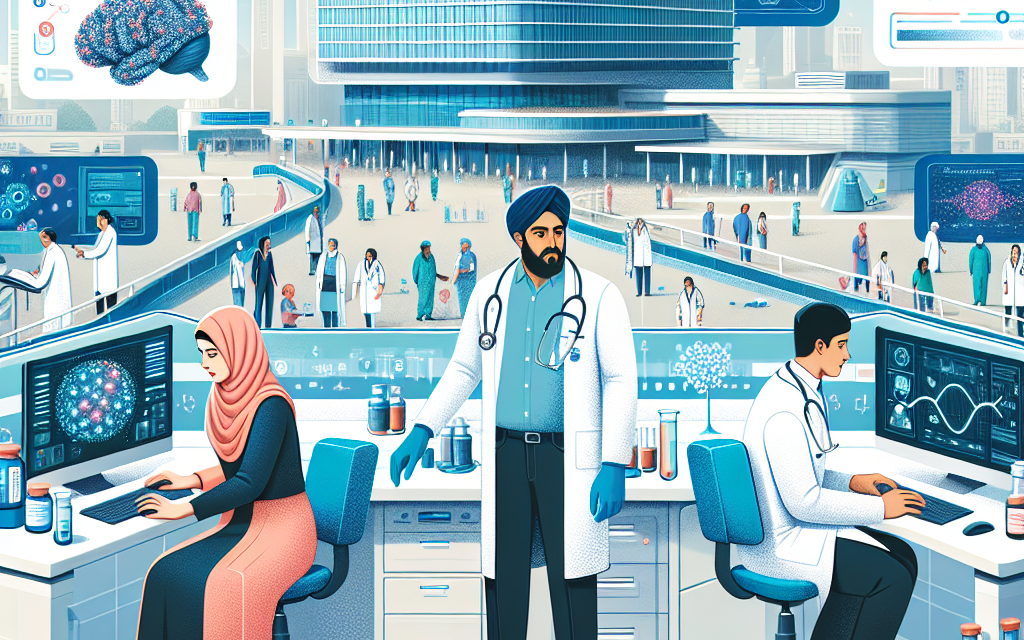Singapore General Hospital Innovates AI Solutions to Combat Antibiotic Resistance
Antibiotic resistance is a growing global health crisis, threatening to render many of our most effective treatments ineffective. In response to this urgent issue, Singapore General Hospital (SGH) has taken a pioneering approach by integrating artificial intelligence (AI) into its healthcare practices. This article explores how SGH is leveraging AI to combat antibiotic resistance, detailing the innovative strategies, technologies, and outcomes associated with this initiative.
The Rising Threat of Antibiotic Resistance
Antibiotic resistance occurs when bacteria evolve and develop the ability to defeat the drugs designed to kill them. This phenomenon has been exacerbated by the overuse and misuse of antibiotics, leading to a situation where common infections can become life-threatening. According to the World Health Organization (WHO), antibiotic resistance is responsible for approximately 700,000 deaths annually, a figure projected to rise to 10 million by 2050 if no action is taken.
In Singapore, the situation is equally concerning. The Ministry of Health has reported increasing rates of antibiotic-resistant infections, particularly in healthcare settings. The emergence of multi-drug resistant organisms (MDROs) poses significant challenges for healthcare providers, necessitating innovative solutions to manage and mitigate these risks.
Understanding Antibiotic Resistance
Antibiotic resistance can be attributed to several factors:
- Overprescription of Antibiotics: Many healthcare providers prescribe antibiotics for viral infections, where they are ineffective.
- Patient Non-compliance: Patients often do not complete their antibiotic courses, allowing bacteria to survive and adapt.
- Use in Agriculture: The use of antibiotics in livestock can contribute to the development of resistant bacteria that can be transmitted to humans.
- Lack of New Antibiotics: The pharmaceutical industry has seen a decline in the development of new antibiotics, leading to a reliance on existing drugs.
These factors highlight the urgent need for innovative solutions to address antibiotic resistance, making SGH’s efforts particularly timely and relevant.
AI-Powered Diagnostics: A Game Changer
One of the most promising applications of AI in combating antibiotic resistance is in the realm of diagnostics. Traditional methods of diagnosing bacterial infections can be time-consuming, often taking days to yield results. This delay can lead to inappropriate antibiotic prescriptions, further fueling resistance.
SGH has implemented AI algorithms that analyze patient data, including symptoms, medical history, and laboratory results, to provide rapid diagnostic insights. By utilizing machine learning techniques, these algorithms can identify patterns and predict the likelihood of specific infections, allowing healthcare providers to make informed decisions more quickly.
Case Study: Rapid Diagnostic Tools
In a recent pilot study at SGH, researchers developed an AI-based diagnostic tool that reduced the time to identify bacterial infections from 48 hours to just 4 hours. This tool analyzes blood cultures and uses natural language processing to interpret clinical notes, providing real-time recommendations for antibiotic therapy.
The results were promising:
- Increased Accuracy: The AI tool achieved an accuracy rate of 92% in identifying the correct pathogen.
- Reduced Antibiotic Use: The implementation of the tool led to a 30% reduction in unnecessary antibiotic prescriptions.
- Improved Patient Outcomes: Patients received targeted therapy sooner, resulting in shorter hospital stays and lower rates of complications.
This case study exemplifies how AI-powered diagnostics can transform the approach to treating infections, ultimately helping to combat antibiotic resistance.
Predictive Analytics for Antibiotic Stewardship
Antibiotic stewardship programs are essential for optimizing the use of antibiotics and minimizing resistance. SGH has integrated predictive analytics into its stewardship efforts, utilizing AI to forecast antibiotic consumption patterns and resistance trends.
By analyzing historical data on antibiotic prescriptions, patient demographics, and infection rates, SGH’s AI systems can identify potential areas of overuse and suggest targeted interventions. This proactive approach allows healthcare providers to adjust their prescribing practices based on real-time data, ensuring that antibiotics are used judiciously.
Implementation of Predictive Models
SGH’s predictive analytics model has several key components:
- Data Collection: The model aggregates data from electronic health records, laboratory results, and pharmacy records.
- Machine Learning Algorithms: These algorithms analyze the data to identify trends and predict future antibiotic use and resistance patterns.
- Real-Time Dashboards: Healthcare providers have access to dashboards that display current antibiotic usage and resistance rates, enabling informed decision-making.
In a recent evaluation, SGH found that the implementation of predictive analytics led to a 25% reduction in broad-spectrum antibiotic prescriptions over six months. This not only helped curb resistance but also improved patient safety by minimizing the risk of adverse drug reactions.
Enhancing Infection Control Measures
Infection control is a critical component of combating antibiotic resistance, particularly in hospital settings where vulnerable patients are at higher risk. SGH has adopted AI-driven solutions to enhance its infection control measures, focusing on early detection and prevention of outbreaks.
AI technologies are being used to monitor infection rates in real-time, allowing healthcare providers to respond swiftly to emerging threats. By analyzing data from various sources, including patient records and environmental sensors, SGH can identify patterns that may indicate an outbreak of antibiotic-resistant infections.
Case Study: AI in Infection Surveillance
SGH implemented an AI-based infection surveillance system that continuously monitors patient data and alerts staff to potential outbreaks. This system uses machine learning algorithms to analyze factors such as:
- Patient demographics
- Recent surgical procedures
- Antibiotic usage patterns
- Environmental factors (e.g., cleanliness of hospital wards)
In a trial conducted over one year, the AI system successfully identified an outbreak of Clostridium difficile infections two weeks earlier than traditional surveillance methods. This early detection allowed SGH to implement targeted infection control measures, including:
- Increased cleaning protocols in affected areas
- Isolation of infected patients
- Enhanced staff training on infection prevention
The result was a significant reduction in the spread of infections, demonstrating the effectiveness of AI in enhancing infection control measures.
Patient Education and Engagement
While technological innovations are crucial in the fight against antibiotic resistance, patient education and engagement are equally important. SGH recognizes that empowering patients with knowledge about antibiotics and their appropriate use can lead to better health outcomes.
SGH has developed AI-driven educational tools that provide personalized information to patients regarding their antibiotic prescriptions. These tools utilize natural language processing to tailor educational content based on individual patient profiles, ensuring that information is relevant and easily understood.
Implementation of Educational Programs
The educational programs at SGH include:
- Interactive Chatbots: Patients can interact with AI chatbots to ask questions about their medications, side effects, and the importance of completing their antibiotic courses.
- Mobile Applications: SGH has launched a mobile app that provides patients with reminders for medication adherence and educational resources about antibiotic resistance.
- Workshops and Seminars: Regular workshops are held to educate patients and their families about the responsible use of antibiotics and the risks associated with misuse.
Feedback from patients has been overwhelmingly positive, with many reporting a better understanding of their treatment plans and the importance of adhering to prescribed antibiotics. This increased awareness is crucial in reducing non-compliance and, consequently, the development of antibiotic resistance.
Conclusion: A Collaborative Approach to Combat Antibiotic Resistance
The innovative use of AI solutions at Singapore General Hospital represents a significant step forward in the fight against antibiotic resistance. By enhancing diagnostics, implementing predictive analytics, improving infection control measures, and engaging patients in their care, SGH is setting a benchmark for healthcare institutions worldwide.
As antibiotic resistance continues to pose a serious threat to global health, the integration of technology and data-driven approaches will be essential in developing effective strategies to combat this crisis. SGH’s commitment to innovation serves as an inspiring model for other healthcare providers, emphasizing the importance of collaboration between technology, healthcare professionals, and patients in addressing one of the most pressing challenges of our time.
In summary, the key takeaways from SGH’s initiatives include:
- The critical need for rapid diagnostics to reduce inappropriate antibiotic use.
- The role of predictive analytics in optimizing antibiotic stewardship.
- The importance of enhanced infection control measures in preventing outbreaks.
- The value of patient education in promoting responsible antibiotic use.
- The potential of AI technologies to transform healthcare practices and improve patient outcomes.
As we look to the future, it is clear that a multifaceted approach, combining technology, education, and collaboration, will be essential in overcoming the challenges posed by antibiotic resistance.





